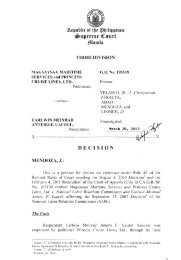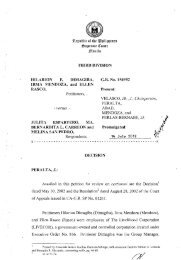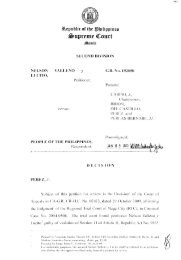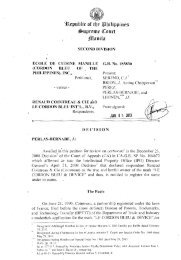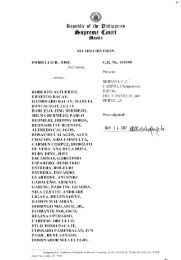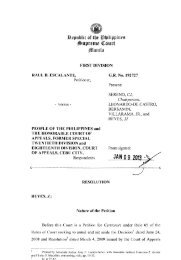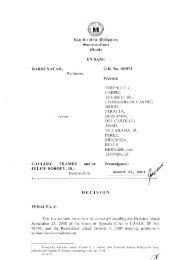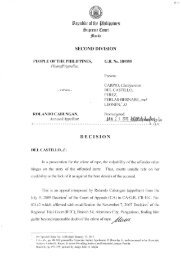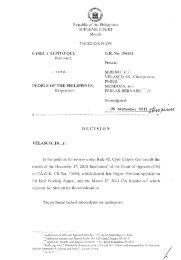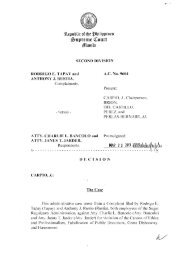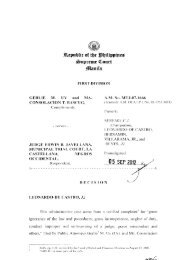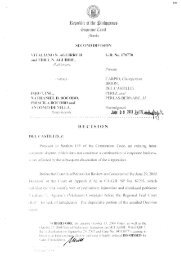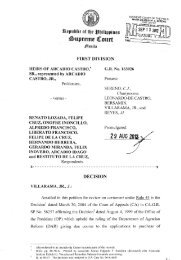A.M. No. RJ-10-2257. July 17, 2012 - Supreme Court of the Philippines
A.M. No. RJ-10-2257. July 17, 2012 - Supreme Court of the Philippines
A.M. No. RJ-10-2257. July 17, 2012 - Supreme Court of the Philippines
Create successful ePaper yourself
Turn your PDF publications into a flip-book with our unique Google optimized e-Paper software.
Decision 2 A. M. <strong>No</strong>. RTJ-<strong>10</strong>-2257<br />
Gross Ignorance <strong>of</strong> <strong>the</strong> Law, and violations <strong>of</strong> Canon 1 (Rule 1.01, 1.02),<br />
Canon 2 (Rule 2.01), and Canon 3 (Rule 3.05) <strong>of</strong> <strong>the</strong> Code <strong>of</strong> Judicial<br />
Conduct relative to Criminal Case <strong>No</strong>. 6898 entitled “People <strong>of</strong> <strong>the</strong><br />
<strong>Philippines</strong> v. Rodolfo Comania.”<br />
According to Gacad, on 3 <strong>No</strong>vember 2009, she went, toge<strong>the</strong>r with her<br />
fa<strong>the</strong>r Jovenciano Cardenas and sister-in-law Agriculita Vda. De Cardenas,<br />
to <strong>the</strong> Office <strong>of</strong> <strong>the</strong> Provincial Prosecutor in Nabunturan, Compostela Valley,<br />
to file criminal charges against <strong>the</strong> suspect who gunned down her bro<strong>the</strong>r<br />
Gregorio Cardenas. They met provincial prosecutor Graciano Arafol, Jr.<br />
(Arafol), who advised <strong>the</strong>m not to hire a private counsel.<br />
The following day, Arafol informed Gacad that he filed a complaint<br />
for murder against <strong>the</strong> suspect but <strong>the</strong> Provincial Governor kept on<br />
pressuring him about her bro<strong>the</strong>r’s case. Arafol suggested that <strong>the</strong>y see Judge<br />
Clapis so he would deny <strong>the</strong> Motion for Reinvestigation to be filed by <strong>the</strong><br />
accused Rodolfo Comania (accused). Arafol, fur<strong>the</strong>r, told Gacad to prepare<br />
an amount <strong>of</strong> P50,000 for Judge Clapis.<br />
On 23 <strong>No</strong>vember 2009, Arafol told Gacad that <strong>the</strong>y would meet Judge<br />
Clapis at <strong>the</strong> Golden Palace Hotel in Tagum City. Thus, Gacad, toge<strong>the</strong>r<br />
with her husband Rene Gacad and <strong>the</strong>ir family driver Jojo Baylosis<br />
(Baylosis), proceeded to <strong>the</strong> Golden Palace Hotel. Inside <strong>the</strong> hotel, Gacad<br />
joined Arafol and his wife at <strong>the</strong>ir table. After a while, Judge Clapis joined<br />
<strong>the</strong>m. Arafol told Judge Clapis, “Judge sya yong sinasabi kong kapitbahay<br />
ko may problema.” Judge Clapis replied, “So, what do you want me to do?”<br />
Afarol answered, “Kailangang madeny ang reinvestigation ni Atty. Gonzaga<br />
and we proceed to trial kasi palaging tumatawag si Governor.” Arafol<br />
paused, and continued, “Wag kang mag-alala judge, mayron syang inihanda<br />
para sa iyo.” Gacad felt terrified because she had not yet agreed to Arafol’s
Decision 3 A. M. <strong>No</strong>. RTJ-<strong>10</strong>-2257<br />
demands. Hence, when Arafol asked her, “Day, kanus a nimo mahatag ang<br />
kwarta?” (When can you give <strong>the</strong> money?), Gacad could only mumble,<br />
“Paningkamutan na ko makakita ko ug kwarta... basin makakita ko sir.” (I<br />
will try to look for money, maybe I can find, sir.) Judge Clapis excitedly<br />
nodded and said, “Sige, kay ako na bahala, gamuson nato ni sila.” (Okay,<br />
leave it all to me, we shall crush <strong>the</strong>m.)<br />
The following day, Arafol instructed his nephew Baldomero Arafol<br />
(Baldomero) to go to Gacad’s house to accompany Baylosis. In Gacad’s<br />
house, Gacad gave P50,000 to Baylosis in <strong>the</strong> presence <strong>of</strong> Baldomero.<br />
Baylosis <strong>the</strong>n drove with Baldomero to Jollibee in Tagum City. Upon <strong>the</strong>ir<br />
arrival, Baldomero alighted and Arafol got into <strong>the</strong> passenger seat. Arafol<br />
directed Baylosis to drive to Mikos C<strong>of</strong>fee Bar. Along <strong>the</strong> way, Arafol took<br />
<strong>the</strong> money from Baylosis. At Mikos C<strong>of</strong>fee Bar, Arafol alighted, telling<br />
Baylosis to wait for him. Then, Arafol went inside Mikos C<strong>of</strong>fee Bar to join<br />
Judge Clapis.<br />
In his Sworn Affidavit dated 8 April 20<strong>10</strong>, Baylosis stated that he<br />
went out <strong>of</strong> <strong>the</strong> vehicle and saw, through <strong>the</strong> full window glass <strong>of</strong> <strong>the</strong> Mikos<br />
C<strong>of</strong>fee Bar, Arafol sitting at a table toge<strong>the</strong>r with Judge Clapis. After Arafol<br />
left Mikos C<strong>of</strong>fee Bar, he told Baylosis to bring him back to Jollibee in<br />
Tagum City.<br />
On <strong>the</strong> second week <strong>of</strong> January 20<strong>10</strong>, Arafol showed to Gacad a copy<br />
<strong>of</strong> Judge Clapis’ Order dated 4 January 20<strong>10</strong> denying <strong>the</strong> Motion for<br />
Reinvestigation filed by <strong>the</strong> accused. Subsequently, Arafol told Gacad that<br />
Judge Clapis was borrowing P50,000 from her for his mo<strong>the</strong>r’s<br />
hospitalization. Arafol handed to Gacad a postdated BPI check allegedly<br />
issued by Judge Clapis as assurance <strong>of</strong> payment. However, Gacad failed to<br />
produce <strong>the</strong> P50,000.
Decision 4 A. M. <strong>No</strong>. RTJ-<strong>10</strong>-2257<br />
Gacad alleged that, from <strong>the</strong>n on, Arafol and Judge Clapis began to<br />
“play different hideous schemes” to prejudice <strong>the</strong>ir case. 2 Judge Clapis set<br />
hearings on 4 February 20<strong>10</strong>, 8 February 20<strong>10</strong>, and 1 March 20<strong>10</strong>. However,<br />
<strong>the</strong> <strong>No</strong>tices for Hearings were mailed only on 1 March 20<strong>10</strong> and were<br />
received by Gacad only on 3 March 20<strong>10</strong>.<br />
Thereafter, Judge Clapis set a hearing for a petition for bail on<br />
29 March 20<strong>10</strong>, which Gacad came to know only inadvertently since she<br />
received no notice for <strong>the</strong> hearing. During <strong>the</strong> 29 March 20<strong>10</strong> hearing, Public<br />
Prosecutor Alona Labtic moved that <strong>the</strong> petition for bail be put in writing.<br />
However, <strong>the</strong> counsel for <strong>the</strong> accused manifested that he was not prepared<br />
for a written petition because it was only right before <strong>the</strong> hearing that <strong>the</strong><br />
accused informed him <strong>of</strong> Arafol’s agreement to bail. Thus, Judge Clapis<br />
calendared <strong>the</strong> case for speedy trial. He set a continuous hearing for <strong>the</strong><br />
petition for bail on 12 April 20<strong>10</strong>, 13 April 20<strong>10</strong>, and 14 April 20<strong>10</strong>.<br />
On 8 April 20<strong>10</strong>, <strong>the</strong> accused filed a Petition For Bail while Gacad<br />
filed a Motion For Inhibition <strong>of</strong> Judge Clapis. On 18 May 20<strong>10</strong>, Judge<br />
Clapis granted <strong>the</strong> accused’s Petition For Bail. On 24 May 20<strong>10</strong>, Judge<br />
Clapis issued a <strong>No</strong>tice <strong>of</strong> Preliminary Conference set on 2 December 20<strong>10</strong>.<br />
On 1 June 20<strong>10</strong>, Judge Clapis inhibited himself.<br />
To bolster her case <strong>of</strong> corruption against Judge Clapis, Gacad<br />
recounted her previous encounter with Judge Clapis and Arafol in Criminal<br />
Case <strong>No</strong>. 6251 against her bro<strong>the</strong>r. According to Gacad, Arafol suggested<br />
that <strong>the</strong>y give Judge Clapis <strong>the</strong> P80,000 cash bond posted in <strong>the</strong> case so that<br />
her bro<strong>the</strong>r’s case could be dismissed. After conceding to Arafol’s proposal,<br />
Judge Clapis indeed dismissed <strong>the</strong> case despite <strong>the</strong> strong evidence against<br />
her bro<strong>the</strong>r.<br />
2 Id. at 4.
Decision 5 A. M. <strong>No</strong>. RTJ-<strong>10</strong>-2257<br />
In an Indorsement letter dated 21 June 20<strong>10</strong>, <strong>the</strong> Office <strong>of</strong> <strong>the</strong> <strong>Court</strong><br />
Administrator (OCA) required Judge Clapis to comment. In his Comment 3<br />
dated 26 <strong>July</strong> 20<strong>10</strong>, Judge Clapis narrated <strong>the</strong> events regarding Criminal<br />
Case <strong>No</strong>. 6898, beginning with <strong>the</strong> arraignment set on <strong>17</strong> December 2009 up<br />
to his inhibition on 1 June 20<strong>10</strong>. Judge Clapis did not attach any documents<br />
to support his narration. Judge Clapis claimed that notices were made<br />
verbally because <strong>of</strong> time constraints. Never<strong>the</strong>less, he stressed that both sides<br />
were given <strong>the</strong> opportunity to be heard since in almost all proceedings,<br />
Gacad was in court and <strong>the</strong> orders were done in open court. He admitted that<br />
his personnel inadvertently scheduled <strong>the</strong> preliminary conference <strong>of</strong> <strong>the</strong> case<br />
to 2 December 20<strong>10</strong>. Finally, he denied owning an account in BPI.<br />
In its Resolution 4 dated 15 December 20<strong>10</strong>, this <strong>Court</strong>’s Second<br />
Division noted <strong>the</strong> recommendation <strong>of</strong> <strong>the</strong> OCA dated 3 <strong>No</strong>vember 20<strong>10</strong> and<br />
resolved to: (1) re-docket <strong>the</strong> instant administrative complaint OCA-IPI <strong>No</strong>.<br />
<strong>10</strong>-3440-RTJ as regular administrative matter A.M. <strong>No</strong>. RTJ-<strong>10</strong>-2257; and<br />
(2) refer <strong>the</strong> matter to <strong>the</strong> Executive Justice <strong>of</strong> <strong>the</strong> <strong>Court</strong> <strong>of</strong> Appeals,<br />
Cagayan de Oro City, for raffle among its Justices, and direct <strong>the</strong> Justice to<br />
whom <strong>the</strong> case is assigned to conduct an investigation on <strong>the</strong> matter and to<br />
submit a report and recommendation within 60 days from receipt <strong>of</strong> <strong>the</strong><br />
records <strong>of</strong> <strong>the</strong> case.<br />
Pursuant to <strong>the</strong> Resolution <strong>of</strong> 15 December 20<strong>10</strong>, <strong>the</strong> records <strong>of</strong> <strong>the</strong><br />
case were forwarded to Justice Romulo V. Borja, <strong>the</strong> Executive Justice <strong>of</strong> <strong>the</strong><br />
<strong>Court</strong> <strong>of</strong> Appeals, Mindanao Station, and <strong>the</strong>n to <strong>the</strong> Raffle Committee. On<br />
<strong>10</strong> May 2011, <strong>the</strong> case was raffled to Justice Zenaida T. Galapate-Laguilles<br />
(Investigating Justice) for investigation. Thereafter, <strong>the</strong> Investigating Justice<br />
ordered <strong>the</strong> parties to submit <strong>the</strong>ir respective evidence, and set <strong>the</strong> case for<br />
3<br />
Id. at 52.<br />
4 Id. at 130.
Decision 6 A. M. <strong>No</strong>. RTJ-<strong>10</strong>-2257<br />
hearing on 14 June 2011, 21 June 2011, and 28 June 2011. The 28 June 2011<br />
hearing was subsequently reset to 28 <strong>July</strong> 2011.<br />
In its Resolution dated 6 <strong>July</strong> 2011, this <strong>Court</strong>’s Second Division<br />
granted <strong>the</strong> Investigating Justice an extension <strong>of</strong> 60 days or until 9<br />
September 2011 to terminate her investigation and submit her<br />
recommendation.<br />
In her undated Report and Recommendation, <strong>the</strong> Investigating Justice<br />
ruled that Judge Clapis committed grave misconduct for acting contrary to<br />
<strong>the</strong> prescribed standard <strong>of</strong> conduct for judges. Although <strong>the</strong> Investigating<br />
Justice was not convinced that Judge Clapis received P50,000, and <strong>the</strong>n tried<br />
to borrow ano<strong>the</strong>r P50,000, from Gacad, she found Gacad’s narration <strong>of</strong> her<br />
meeting with Judge Clapis in Golden Palace Hotel as credible. The<br />
Investigating Justice stated:<br />
x x x In a provincial setting such as <strong>the</strong> place where <strong>the</strong> parties come<br />
from, it is not difficult to imagine <strong>the</strong> considerable power that persons<br />
<strong>of</strong> <strong>the</strong> respondent’s calibre could wield in <strong>the</strong> mind <strong>of</strong> a litigant such as<br />
<strong>the</strong> complainant herein. The substance and tenor <strong>of</strong> <strong>the</strong> complainant’s<br />
testimony and element <strong>of</strong> possible motivation on <strong>the</strong> part <strong>of</strong> <strong>the</strong><br />
respondent given his unrefuted closeness with Prosecutor Arafol<br />
convince this Justice that <strong>the</strong> complainant is telling <strong>the</strong> truth.<br />
x x x x<br />
x x x Respondent judge merely <strong>of</strong>fered a flat denial when he could<br />
have presented Prosecutor Arafol to buttress his disavowal <strong>of</strong> any<br />
imputed misconduct on his part. x x x Respondent’s reaction,<br />
however, is regrettably lackadaisical, if not abnormal, for one whose<br />
integrity was shred to pieces by no less than <strong>the</strong> Trial Prosecutor who<br />
is his partner, in an almost daily basis, in <strong>the</strong> task <strong>of</strong> dispensing justice.<br />
There is simply no showing indeed that respondent herein took<br />
umbrage at Prosecutor Arafol’s alleged brazenness and daring to sully<br />
his name. 5<br />
Fur<strong>the</strong>rmore, <strong>the</strong> Investigating Justice found Judge Clapis liable for<br />
gross ignorance <strong>of</strong> <strong>the</strong> law. Judge Clapis was partial in granting bail to <strong>the</strong><br />
5<br />
Id. at 412-413.
Decision 7 A. M. <strong>No</strong>. RTJ-<strong>10</strong>-2257<br />
accused and in failing to set <strong>the</strong> case for hearing within a reasonable time.<br />
Accordingly, <strong>the</strong> Investigating Justice recommended <strong>the</strong> penalties <strong>of</strong>:<br />
(1) suspension for one year without salary and o<strong>the</strong>r benefits for gross<br />
misconduct; (2) a fine <strong>of</strong> P20,000.00 for gross ignorance <strong>of</strong> <strong>the</strong> law; and<br />
(3) reprimand for neglect <strong>of</strong> duty.<br />
In a Memorandum dated 11 January <strong>2012</strong>, <strong>the</strong> OCA agreed with <strong>the</strong><br />
findings <strong>of</strong> <strong>the</strong> Investigating Justice but disagreed with <strong>the</strong> recommended<br />
penalties. The OCA found that Judge Clapis violated Canon 1 (Rule 1.01 and<br />
Rule 1.02) and Canon 2 (Rule 2.01) <strong>of</strong> <strong>the</strong> Code <strong>of</strong> Judicial Conduct. The<br />
OCA also found Judge Clapis liable for gross ignorance <strong>of</strong> <strong>the</strong> law for failing<br />
to observe <strong>the</strong> rules in hearing <strong>the</strong> petition for bail and to accord <strong>the</strong><br />
prosecution due process. Accordingly, <strong>the</strong> OCA recommended <strong>the</strong> penalties<br />
<strong>of</strong>: (1) suspension for six months for gross misconduct; and (2) a fine <strong>of</strong><br />
P40,000 for gross ignorance <strong>of</strong> <strong>the</strong> law.<br />
We have ruled that in administrative proceedings, <strong>the</strong> complainant has<br />
<strong>the</strong> burden to prove his accusations against respondent with substantial<br />
evidence or such amount <strong>of</strong> evidence which a reasonable mind might accept<br />
as adequate to support a conclusion. 6 This <strong>Court</strong> has consistently ruled that<br />
charges based on mere suspicion and speculation cannot be given credence. 7<br />
In <strong>the</strong> present case, <strong>the</strong>re is indeed no substantial evidence that Judge<br />
Clapis received <strong>the</strong> P50,000 given by Gacad to Arafol, and that Judge Clapis<br />
tried to borrow ano<strong>the</strong>r P50,000 from Gacad secured by a check allegedly<br />
signed by Judge Clapis himself. The testimony <strong>of</strong> Gacad, stating that Judge<br />
Clapis received P50,000 and tried to borrow ano<strong>the</strong>r P50,000 from her, both<br />
6<br />
7<br />
Monticalbo v. Maraya, Jr., A.M. <strong>No</strong>. RTJ-09-2197, 13 April 2011, 648 SCRA 573 citing De Jesus<br />
v. Guerrero III, G.R. <strong>No</strong>. <strong>17</strong>1491, 4 September 2009, 598 SCRA 341; Manalabe v. Cabie, A.M.<br />
<strong>No</strong>. P-05-1984, 6 <strong>July</strong> 2007, 526 SCRA 582; Adajar v. Develos, 512 Phil. 9 (2005); Ong v. Rosete,<br />
484 Phil. <strong>10</strong>2 (2004); Datuin, Jr. v. Soriano, 439 Phil. 592 (2002).<br />
Id. citing Office <strong>of</strong> <strong>the</strong> <strong>Court</strong> Administrator v. Lopez, A.M. <strong>No</strong>. P-<strong>10</strong>-2788, 18 January 2011, 639<br />
SCRA 633.
Decision 8 A. M. <strong>No</strong>. RTJ-<strong>10</strong>-2257<br />
through Arafol, cannot be given due weight for being hearsay evidence. On<br />
<strong>the</strong> o<strong>the</strong>r hand, although Baylosis testified based on his personal knowledge,<br />
he did not categorically state that he saw Arafol give <strong>the</strong> money to Judge<br />
Clapis. In addition, <strong>the</strong> check allegedly issued by Judge Clapis was in <strong>the</strong><br />
account name <strong>of</strong> Arafol as attested by <strong>the</strong> BPI Business Manager’s<br />
Certification. Hence, Gacad fell short <strong>of</strong> <strong>the</strong> required degree <strong>of</strong> pro<strong>of</strong> needed<br />
in an administrative charge <strong>of</strong> corruption.<br />
We, however, find Judge Clapis liable for gross misconduct. In Kaw<br />
v. Osorio, 8 <strong>the</strong> <strong>Court</strong> held that while <strong>the</strong> respondent judge, in that case, may<br />
not be held liable for extortion and corruption as it was not substantially<br />
proven, he should be made accountable for gross misconduct.<br />
In <strong>the</strong> present case, <strong>the</strong> Investigating Justice found Gacad’s narration,<br />
that she met and talked with Judge Clapis in <strong>the</strong> Golden Palace Hotel, as<br />
credible. Gacad categorically and unwaveringly narrated her conversation<br />
with Judge Clapis and Arafol. On <strong>the</strong> o<strong>the</strong>r hand, Judge Clapis merely<br />
denied Gacad’s allegation during <strong>the</strong> hearing conducted by <strong>the</strong> Investigating<br />
Justice, but not in his Comment, and without presenting any evidence to<br />
support his denial. It is a settled rule that <strong>the</strong> findings <strong>of</strong> investigating<br />
magistrates are generally given great weight by <strong>the</strong> <strong>Court</strong> by reason <strong>of</strong> <strong>the</strong>ir<br />
unmatched opportunity to see <strong>the</strong> deportment <strong>of</strong> <strong>the</strong> witnesses as <strong>the</strong>y<br />
testified. 9 The rule which concedes due respect, and even finality, to <strong>the</strong><br />
assessment <strong>of</strong> credibility <strong>of</strong> witnesses by trial judges in civil and criminal<br />
cases applies a fortiori to administrative cases. <strong>10</strong><br />
Thus, <strong>the</strong> acts <strong>of</strong> Judge Clapis in meeting Gacad, a litigant in a case<br />
pending before his sala, and telling her, “Sige, kay ako na bahala gamuson<br />
8<br />
469 Phil. 896 (2004).<br />
9<br />
Ocampo v. Arcaya-Chua, A.M. <strong>No</strong>. RTJ-07-2093, 23 April 20<strong>10</strong>, 619 SCRA 60, citing Vidallon-<br />
Magtolis v. Salud, 506 Phil. 423 (2005).<br />
<strong>10</strong> Ferreras v. Eclipse, A.M. <strong>No</strong>. P-05-2085, 20 January 20<strong>10</strong>, 6<strong>10</strong> SCRA 359.
Decision 9 A. M. <strong>No</strong>. RTJ-<strong>10</strong>-2257<br />
nato ni sila” (Okay, leave it all to me, we shall crush <strong>the</strong>m.), both favoring<br />
Gacad, constitute gross misconduct.<br />
In Sevilla v. Lindo, 11 where <strong>the</strong> respondent judge tolerated <strong>the</strong><br />
unreasonable postponements made in a case, <strong>the</strong> <strong>Court</strong> held that such<br />
conduct proceeded from bias towards <strong>the</strong> accused, rendering such acts and<br />
omissions as gross misconduct.<br />
Misconduct means intentional wrongdoing or deliberate violation <strong>of</strong> a<br />
rule <strong>of</strong> law or standard <strong>of</strong> behavior in connection with one’s performance <strong>of</strong><br />
<strong>of</strong>ficial functions and duties. 12 For grave or gross misconduct to exist, <strong>the</strong><br />
judicial act complained <strong>of</strong> should be corrupt or inspired by <strong>the</strong> intention to<br />
violate <strong>the</strong> law, or a persistent disregard <strong>of</strong> well-known rules. 13 The<br />
misconduct must imply wrongful intention and not a mere error <strong>of</strong><br />
judgment. 14<br />
Judge Clapis’ wrongful intention and lack <strong>of</strong> judicial reasoning are<br />
made overt by <strong>the</strong> circumstances on record. First, <strong>the</strong> <strong>No</strong>tices <strong>of</strong> Hearings<br />
were mailed to Gacad only after <strong>the</strong> hearing. Second, Judge Clapis started<br />
conducting <strong>the</strong> bail hearings without an application for bail and granted bail<br />
without affording <strong>the</strong> prosecution <strong>the</strong> opportunity to prove that <strong>the</strong> guilt <strong>of</strong><br />
<strong>the</strong> accused is strong. Third, Judge Clapis set a preliminary conference seven<br />
months from <strong>the</strong> date it was set, patently contrary to his declaration <strong>of</strong><br />
speedy trial for <strong>the</strong> case. Judge Clapis cannot escape liability by shifting <strong>the</strong><br />
blame to his court personnel. He ought to know that judges are ultimately<br />
11<br />
A.M. <strong>No</strong>. MTJ-08-<strong>17</strong>14, 9 February 2011, 642 SCRA 277.<br />
12 Salazar v. Barriga, A.M. <strong>No</strong>. P-05-2016, 19 April 2007, 521 SCRA 449, citing Civil Service<br />
Commission v. Belagan, 483 Phil. 601 (2004); Civil Service Commission v. Lucas, 361 Phil. 486<br />
(1999).<br />
13<br />
Id.<br />
14 Almojuela v. Ringor, Jr., 479 Phil. 131 (2004), citing Mercado v. Dysangco, 434 Phil. 547 (2002).
Decision <strong>10</strong> A. M. <strong>No</strong>. RTJ-<strong>10</strong>-2257<br />
responsible for order and efficiency in <strong>the</strong>ir courts, and <strong>the</strong> subordinates are<br />
not <strong>the</strong> guardians <strong>of</strong> <strong>the</strong> judge’s responsibility. 15<br />
The arbitrary actions <strong>of</strong> respondent judge, taken toge<strong>the</strong>r, give doubt<br />
as to his impartiality, integrity and propriety. His acts amount to gross<br />
misconduct constituting violations <strong>of</strong> <strong>the</strong> New Code <strong>of</strong> Judicial Conduct,<br />
particularly:<br />
15<br />
CANON 2. INTEGRITY IS ESSENTIAL NOT ONLY TO THE<br />
PROPER DISCHARGE OF THE JUDICIAL OFFICE BUT ALSO TO<br />
THE PERSONAL DEMEANOR OF JUDGES.<br />
Section 1. Judges shall ensure that not only is <strong>the</strong>ir conduct above<br />
reproach, but that it is perceived to be so in <strong>the</strong> view <strong>of</strong> a reasonable<br />
observer.<br />
Section 2. The behavior and conduct <strong>of</strong> judges must reaffirm <strong>the</strong> people’s<br />
faith in <strong>the</strong> integrity <strong>of</strong> <strong>the</strong> judiciary. Justice must not merely be done but<br />
must also be seen to be done.<br />
x x x<br />
CANON 3. IMPARTIALITY IS ESSENTIAL TO THE PROPER<br />
DISCHARGE OF THE JUDICIAL OFFICE. IT APPLIES NOT ONLY<br />
TO THE DECISION ITSELF BUT ALSO TO THE PROCESS BY<br />
WHICH THE DECISION IS TO BE MADE.<br />
x x x<br />
Section 2. Judges shall ensure that his or her conduct, both in and out <strong>of</strong><br />
court, maintains and enhances <strong>the</strong> confidence <strong>of</strong> <strong>the</strong> public, <strong>the</strong> legal<br />
pr<strong>of</strong>ession and litigants in <strong>the</strong> impartiality <strong>of</strong> <strong>the</strong> judge and <strong>the</strong> judiciary.<br />
x x x<br />
Section 4. Judges shall not knowingly, while a proceeding is before, or<br />
could come before <strong>the</strong>m, make any comment that might reasonably be<br />
expected to affect <strong>the</strong> outcome <strong>of</strong> such proceeding or impair <strong>the</strong> manifest<br />
fairness <strong>of</strong> <strong>the</strong> process. <strong>No</strong>r shall judges make any comment in public or<br />
o<strong>the</strong>rwise that might affect <strong>the</strong> fair trial <strong>of</strong> any person or issue.<br />
x x x<br />
Kara-an v. Lindo, A.M. <strong>No</strong>. MTJ-07-1674, 19 April 2007, 521 SCRA 423, citing Hilario v.<br />
Concepcion, 383 Phil. 843 (2000).
Decision 11 A. M. <strong>No</strong>. RTJ-<strong>10</strong>-2257<br />
CANON 4. PROPRIETY AND THE APPEARANCE OF PROPRIETY<br />
ARE ESSENTIAL TO THE PERFORMANCE OF ALL THE<br />
ACTIVITIES OF A JUDGE.<br />
Section 1. Judges shall avoid impropriety and <strong>the</strong> appearance <strong>of</strong><br />
impropriety in all <strong>of</strong> <strong>the</strong>ir activities.<br />
x x x<br />
It is an ironclad principle that a judge must not only be impartial; he<br />
must also appear to be impartial at all times. 16 Being in constant scrutiny by<br />
<strong>the</strong> public, his language, both written and spoken, must be guarded and<br />
measured lest <strong>the</strong> best <strong>of</strong> intentions be misconstrued. <strong>17</strong> Needless to state, any<br />
gross misconduct seriously undermines <strong>the</strong> faith and confidence <strong>of</strong> <strong>the</strong><br />
people in <strong>the</strong> judiciary.<br />
We also find Judge Clapis liable for gross ignorance <strong>of</strong> <strong>the</strong> law for<br />
conducting bail hearings without a petition for bail being filed by <strong>the</strong><br />
accused and without affording <strong>the</strong> prosecution an opportunity to prove that<br />
<strong>the</strong> guilt <strong>of</strong> <strong>the</strong> accused is strong.<br />
Section 8 <strong>of</strong> Rule 114 provides that “at <strong>the</strong> hearing <strong>of</strong> an application<br />
for bail filed by <strong>the</strong> person who is in custody for <strong>the</strong> commission <strong>of</strong> an<br />
<strong>of</strong>fense punishable by death, reclusion perpetua or life imprisonment, <strong>the</strong><br />
prosecution has <strong>the</strong> burden <strong>of</strong> showing that evidence <strong>of</strong> guilt is strong.<br />
x x x.” This rule presupposes that: (1) an application for bail was filed, and<br />
(2) <strong>the</strong> judge notified <strong>the</strong> prosecutor and conducted a bail hearing for <strong>the</strong><br />
prosecution to adduce evidence to prove <strong>the</strong> guilt <strong>of</strong> <strong>the</strong> accused.<br />
In <strong>the</strong> present case, <strong>the</strong> records show that Judge Clapis set <strong>the</strong> first bail<br />
hearing on 29 March 20<strong>10</strong> yet <strong>the</strong> Petition For Bail was filed only on 8 April<br />
20<strong>10</strong>. Fur<strong>the</strong>rmore, <strong>the</strong> 12, 13 and 14 April 20<strong>10</strong> bail hearings reveal that <strong>the</strong><br />
prosecution was not given <strong>the</strong> opportunity to be heard in court. During <strong>the</strong><br />
16<br />
<strong>17</strong><br />
De Guzman , Jr. v. Sison, 407 Phil. 351 (2001).<br />
Id.
Decision 12 A. M. <strong>No</strong>. RTJ-<strong>10</strong>-2257<br />
12 April 20<strong>10</strong> hearing, Gacad appeared by herself because <strong>the</strong> private<br />
prosecutor, who was to appear in her behalf, filed a Motion to Withdraw as<br />
Counsel. Gacad requested for more time to secure a new private counsel.<br />
Gacad also manifested that she already filed a motion for Arafol to inhibit<br />
from <strong>the</strong> case. Judge Clapis allowed her to secure a new private counsel but<br />
<strong>the</strong> hearing proceeded with <strong>the</strong> accused alone being given <strong>the</strong> opportunity to<br />
present his evidence. It was only during <strong>the</strong> 14 April 20<strong>10</strong> hearing, <strong>the</strong> last<br />
day <strong>of</strong> hearing, that Gacad was represented by ano<strong>the</strong>r public prosecutor<br />
since she could not secure a new private counsel. But immediately after <strong>the</strong><br />
defense completed presenting its evidence in support <strong>of</strong> its bail application,<br />
<strong>the</strong> petition for bail was submitted for resolution. The prosecution was not<br />
given an opportunity to present evidence to prove that <strong>the</strong> guilt <strong>of</strong> <strong>the</strong><br />
accused is strong. Judge Clapis’ Order granting bail indicates that he merely<br />
used as basis <strong>the</strong> affidavit <strong>of</strong> one prosecution witness that was submitted<br />
earlier. Clearly, Judge Clapis failed to observe <strong>the</strong> proper procedure in<br />
granting bail.<br />
As stated in <strong>the</strong> report <strong>of</strong> <strong>the</strong> Investigating Justice:<br />
It is true that proceedings were conducted on April 12, 13 and 14,<br />
20<strong>10</strong> but nowhere in <strong>the</strong>se settings was <strong>the</strong> Prosecution given an ample<br />
opportunity to oppose <strong>the</strong> Petition or to prove that <strong>the</strong> evidence <strong>of</strong> guilt <strong>of</strong><br />
<strong>the</strong> accused is strong. There was even no inquiry from <strong>the</strong> respondent as to<br />
<strong>the</strong> character or reputation <strong>of</strong> <strong>the</strong> accused and <strong>the</strong> probability <strong>of</strong> his flight<br />
during <strong>the</strong> trial. These are important and basic questions to be considered<br />
by a conscientious judge whenever a Petition for Bail in a capital <strong>of</strong>fense<br />
is laid before him. Jurisprudence clearly instructs that “in cases where<br />
(<strong>the</strong>) grant <strong>of</strong> bail is discretionary, due process requires that <strong>the</strong><br />
Prosecution must be given <strong>the</strong> opportunity to present within a reasonable<br />
period all <strong>the</strong> evidence it may desire to produce before <strong>the</strong> court should<br />
resolve <strong>the</strong> Motion for Bail.”<br />
Sadly for respondent, he seemed unaware that he was duty-bound<br />
to require <strong>the</strong> presentation <strong>of</strong> pro<strong>of</strong> <strong>of</strong> guilt <strong>of</strong> <strong>the</strong> accused because without<br />
it, he would have no basis for <strong>the</strong> exercise <strong>of</strong> his discretion on whe<strong>the</strong>r or<br />
not bail should be granted. It was precipitate <strong>of</strong> him to simply consider <strong>the</strong><br />
affidavit <strong>of</strong> one prosecution witness and conclude that “<strong>the</strong>re was no<br />
ambush but <strong>the</strong>re was merely a shootout, as to who fired first it cannot be<br />
determined because <strong>the</strong> affidavit <strong>of</strong> <strong>the</strong> prosecution witness did not state
Decision 13 A. M. <strong>No</strong>. RTJ-<strong>10</strong>-2257<br />
so x x x and mainly on this basis, <strong>the</strong> <strong>Court</strong> is convinced that <strong>the</strong><br />
prosecution failed to establish that evidence <strong>of</strong> guilt is strong for <strong>the</strong><br />
<strong>Court</strong> to deny <strong>the</strong> Petition <strong>of</strong> accused Rodolfo Comania to be admitted to<br />
Bail.” 18<br />
Gacal v. Infante 19 is instructive on this issue. The respondent judge in<br />
that case was held guilty <strong>of</strong> gross ignorance <strong>of</strong> <strong>the</strong> law and <strong>the</strong> rules when he<br />
granted bail to <strong>the</strong> accused charged with murder without conducting a<br />
hearing and despite <strong>the</strong> absence <strong>of</strong> a petition for bail from <strong>the</strong> accused. The<br />
<strong>Court</strong> emphasized that bail cannot be allowed to a person charged with a<br />
capital <strong>of</strong>fense, or an <strong>of</strong>fense punishable with reclusion perpetua or life<br />
imprisonment, without a hearing upon notice to <strong>the</strong> prosecution; o<strong>the</strong>rwise, a<br />
violation <strong>of</strong> due process occurs.<br />
Here, <strong>the</strong> act <strong>of</strong> Judge Clapis is not a mere deficiency in prudence,<br />
discretion and judgment but a patent disregard <strong>of</strong> well-known rules. When an<br />
error is so gross and patent, such error produces an inference <strong>of</strong> bad faith,<br />
making <strong>the</strong> judge liable for gross ignorance <strong>of</strong> <strong>the</strong> law. 20 If judges are<br />
allowed to wantonly misuse <strong>the</strong> powers vested in <strong>the</strong>m by <strong>the</strong> law, <strong>the</strong>re will<br />
not only be confusion in <strong>the</strong> administration <strong>of</strong> justice but also oppressive<br />
disregard <strong>of</strong> <strong>the</strong> basic requirements <strong>of</strong> due process. 21<br />
Under Section 8(9), Rule 140 <strong>of</strong> <strong>the</strong> Rules <strong>of</strong> <strong>Court</strong>, gross misconduct<br />
and gross ignorance <strong>of</strong> <strong>the</strong> law or procedure are both classified as serious<br />
charges, for which <strong>the</strong> imposable penalties are any <strong>of</strong> <strong>the</strong> following:<br />
1. Dismissal from <strong>the</strong> service, forfeiture <strong>of</strong> all or part <strong>of</strong> <strong>the</strong> benefits<br />
as <strong>the</strong> <strong>Court</strong> may determine, and disqualification from<br />
reinstatement or appointment to any public <strong>of</strong>fice, including<br />
government-owned or controlled corporation: Provided, however,<br />
that <strong>the</strong> forfeiture <strong>of</strong> benefits shall in no case include accrued leave<br />
credits;<br />
18<br />
Rollo, pp. 420-421.<br />
19<br />
A.M. <strong>No</strong>. RTJ-04-1845, 5 October 2011, 658 SCRA 535.<br />
20 Dipatuan v. Mangotara, A.M. <strong>No</strong>. RTJ-09-2190, 23 April 20<strong>10</strong>, 619 SCRA 48, citing Reyes v.<br />
Paderanga, A.M. <strong>No</strong>. RTJ-06-1973, 14 March 2008, 548 SCRA 244.<br />
21 Id.
Decision 14 A. M. <strong>No</strong>. RTJ-<strong>10</strong>-2257<br />
2. Suspension from <strong>of</strong>fice without salary and o<strong>the</strong>r benefits for more<br />
than three (3) but not exceeding six (6) months; or<br />
3. A fine <strong>of</strong> more than P20,000.00 but not exceeding P40,000.00. 22<br />
Judge Clapis had already been administratively sanctioned in Humol<br />
v. Clapis Jr., 23 where he was fined P30,000 for gross ignorance <strong>of</strong> <strong>the</strong> law. In<br />
this previous case, <strong>the</strong> <strong>Court</strong> sanctioned Judge Clapis for his failure to hear<br />
and consider <strong>the</strong> evidence <strong>of</strong> <strong>the</strong> prosecution in granting bail to <strong>the</strong> accused.<br />
His order relied solely on <strong>the</strong> arguments <strong>of</strong> counsel for <strong>the</strong> accused. In<br />
Humol, 24 <strong>the</strong> <strong>Court</strong> reminded Judge Clapis <strong>of</strong> <strong>the</strong> duties <strong>of</strong> a trial judge when<br />
an application for bail is filed, but in <strong>the</strong> present case, he ignored <strong>the</strong> same.<br />
Therefore, we now impose upon him <strong>the</strong> extreme administrative penalty <strong>of</strong><br />
dismissal from <strong>the</strong> service. In Mangandingan v. Adiong, 25 <strong>the</strong> <strong>Court</strong><br />
dismissed Judge Santos Adiong from service upon a finding <strong>of</strong> guilt for<br />
gross ignorance <strong>of</strong> <strong>the</strong> law as well as gross misconduct constituting violation<br />
<strong>of</strong> <strong>the</strong> Code <strong>of</strong> Judicial Conduct.<br />
Again, judges are reminded that having accepted <strong>the</strong> exalted position<br />
<strong>of</strong> a judge, <strong>the</strong>y owe it to <strong>the</strong> public to uphold <strong>the</strong> exacting standard <strong>of</strong><br />
conduct demanded from <strong>the</strong>m. As <strong>the</strong> <strong>Court</strong> repeatedly stressed:<br />
The exacting standards <strong>of</strong> conduct demanded from judges are<br />
designed to promote public confidence in <strong>the</strong> integrity and impartiality <strong>of</strong><br />
<strong>the</strong> judiciary because <strong>the</strong> people’s confidence in <strong>the</strong> judicial system is<br />
founded not only on <strong>the</strong> magnitude <strong>of</strong> legal knowledge and <strong>the</strong> diligence<br />
<strong>of</strong> <strong>the</strong> members <strong>of</strong> <strong>the</strong> bench, but also on <strong>the</strong> highest standard <strong>of</strong> integrity<br />
and moral uprightness <strong>the</strong>y are expected to possess. When <strong>the</strong> judge<br />
himself becomes <strong>the</strong> transgressor <strong>of</strong> any law which he is sworn to apply,<br />
he places his <strong>of</strong>fice in disrepute, encourages disrespect for <strong>the</strong> law and<br />
impairs public confidence in <strong>the</strong> integrity and impartiality <strong>of</strong> <strong>the</strong> judiciary<br />
itself. It is <strong>the</strong>refore paramount that a judge’s personal behavior both in<br />
<strong>the</strong> performance <strong>of</strong> his duties and his daily life, be free from any<br />
appearance <strong>of</strong> impropriety as to be beyond reproach. 26<br />
22 Rules <strong>of</strong> <strong>Court</strong>, Rule 140, Section 11.<br />
23<br />
A.M. <strong>No</strong>. RTJ-11-2285, 27 <strong>July</strong> 2011, 654 SCRA 406.<br />
24 Id.<br />
25<br />
A.M. <strong>No</strong>. RTJ-04-1826, 6 February 2008, 544 SCRA 43.<br />
26 Tan v. Rosete, 481 Phil. 189 (2004).



